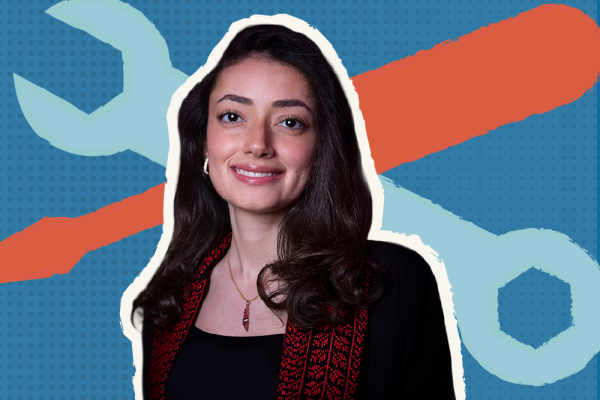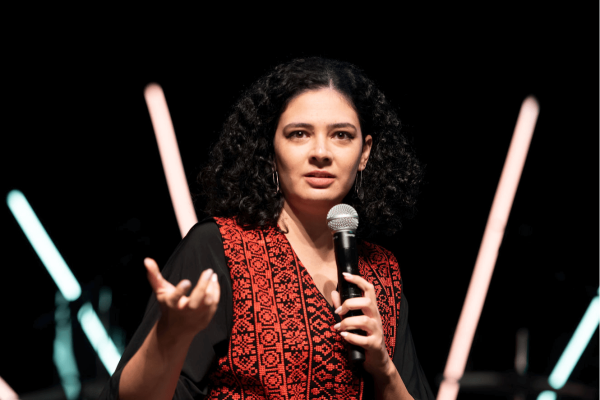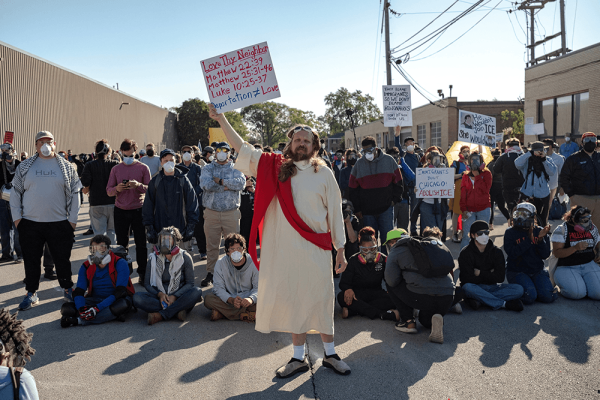This interview is part of The Reconstruct, a weekly newsletter from Sojourners. In a world where so much needs to change, Mitchell Atencio and Josiah R. Daniels interview people who have faith in a new future and are working toward repair. Subscribe here.
The Committee to Protect Journalists has estimated that since Israel’s war with Gaza began in October 2023, Israel has killed 235 journalists and imprisoned another 86. According to CPJ, this has been the deadliest period for journalists since they first began collecting data in 1992.
The journalists who have suffered the most have been Gazans. Of the 237 journalists killed, 195 have been Palestinian journalists in Gaza. There is convincing evidence that suggests Israel is targeting journalists in Gaza or intentionally trying to link them to terrorist organizations, even when such connections are absent.
Plestia Alaqad, who entered the spotlight during the early days of Israel’s bombardment of Gaza due to her live reporting from the enclave, was forced to flee Gaza to protect herself and her family. She has created viral TikToks, contributed to The Guardian, and now has written her first book, The Eyes of Gaza: A Diary of Resilience.
The book is Alaqad’s harrowing and intimate account of her life in Gaza after the events of October 7. In The Eyes of Gaza, readers get to see Alaqad embrace her calling as a journalist and are confronted with the dire realities of occupation and genocide. Readers are also introduced to the scenes of daily life in Gaza, moments of levity and resilience.
I spoke with Alaqad in September about the deteriorating situation in Gaza, what journalists in the West can do to stand in solidarity with Palestinian journalists, and her new book.
This conversation has been edited for length and clarity.
Josiah R. Daniels, Sojourners: So, your book is called The Eyes of Gaza. It was originally released in April, but an updated version is being released in September. What is new in this most recent version?
Plestia Alaqad: There will be an afterword chapter talking about my experience, and there will be pictures as well. For the first version of the book [which came out in April 2025], I wanted people to just imagine things for themselves and for them to paint their own pictures. But for this version of the book [which comes out on September 30], I was like, “OK, this is history. It needs to be documented, and these pictures are documentation of it.”
What are the things happening in Gaza that we don’t see on TV?
The details of daily life, where the past couple of days we are seeing Israel bombing residential towers. But what we don’t see is that this isn’t just like a building that they’re bombing. This is someone’s house. This is someone’s everything, and the memories of your house will never be replaced. So, I don’t feel like people see all the emotions behind what you feel when you actually lose the house.
It’s not like something that can be rebuilt.
Another detail that we don’t see on TV is when women get their periods and how difficult it is. There are no clean bathrooms to actually enter, and there are all these little girls who get their period for their first time, and they don’t even have a mom to take care of them.
You write the following: “It would seem that the eyes and ears of the world aren’t interested in Palestinian life, only in Palestinian death.” How can this be changed?
Simply, it can be changed by the media reporting on the ones who are alive and reporting on their stories, rather than only honoring them after they are killed.
And I’ve seen that happening with a lot of journalists. And for example, with Hind Rajab, there are thousands of Hind Rajabs that we could try and save right now. We don’t need to wait for them to get killed, so only then will we start making movies about them or honoring them, right? Like, how about we try to save their lives?
This is something you write in the book: “You might perceive Gaza as a desperate place. And yes, there is death and there is destruction, and it’s not fair and we know that there’s a better world out there. But that’s not what I see when I look at Her. I see only the unity and resilience of Her people. While many have been displaced and lost their lives, we remain determined to live on, and we refuse to let the losses we’ve suffered dictate our future.”
What are some stories that emphasize that resilience?
I appreciate your question, and I understand your question. It’s just that this is the answer that I want to be in the interview: We can’t try now to celebrate the culture of a people who are getting ethnically cleansed—talk about their food traditions while they’re getting vanished. That’s the point. I understand and respect your question, but this is the point that I want to try to make.
So then let me ask the question in a different way: What are some stories of Palestinians resisting or being agents of disruption in terms of the Israeli occupation?
I don’t quite understand the question.
Maybe I misunderstood you in the book, which is quite possible. But I think that there is a narrative right now. Around Palestinians where—
No, I don’t think you misunderstood me or anything. I just think that I’m the one who’s not understanding right now.
Let me explain where I’m coming from.
Yes, please. Do you want me to talk about, like, optimistic moments, for example?
No. Not at all. What I’m saying is I think that there is a narrative that Palestinians do not have any agency, and to a certain extent, that’s true because of the occupation, because of the genocide.
Oh yes. Now—
But there are situations where Palestinians are attempting to resist, even if it’s in feeble ways. And so that’s what I’m trying to provide the space for, because I think that a lot of the stories are just about death and destruction. But I also know that there are Palestinians who are trying to organize for a better future. Does that question make sense now?
Yes. Yes. Yes. There is more to Palestine than the genocide, and there is more to Palestinians than their struggle.
Maybe most of the world got to know Gaza and Gazans after October 2023. But we had a whole different life before that, even though there was occupation limitations, restrictions, not everything was allowed in, you can’t always travel, borders can open and close anytime. You can get stuck outside of Gaza, you can get stuck inside of Gaza. But Gaza was like that small, simple place that gives you all emotions, a sort of belonging.
READ MORE: The Israeli Human Rights Group Urging the World to Confront Genocide
And now I’ll say something that won’t make sense maybe to you or to many people: Even though Gaza isn’t safe, I always feel that it’s the only place I have completely felt safe in because it’s home. Even though you sometimes sleep and wake up not knowing what will happen or if you’ll be alive or if one of your loved ones will be killed, you somehow feel safe ‘cause you’re home. But when you’re outside of Gaza, you never completely feel safe.
[Gaza] is the only place where I feel completely safe, minus the occupation and getting killed.
How can journalists in the West stand in solidarity with journalists who are working in Gaza?
They can begin by calling things as they are and not calling a genocide a conflict. And by treating these stories as if they are their own stories and using the right terminology. And by reporting on the stories of the people who are alive and not waiting for them to be killed, to wait and then talk about them.
And by giving Palestinians and Palestinian journalists a platform to actually talk, to have their own voice and express what’s happening, and to amplify their voices, but not to speak over them. Avoid speaking about Palestinians without including them in the conversation.
There have been some terrifying repercussions for people who speak out in support of Palestinians. We’ve seen this most obviously in the cases of Mahmoud Khalil and Mohsen Mahdawi. Considering this, how do we find ways to encourage people to advocate for Palestinians?
If we are all speaking out about Palestine, they can’t put us all in jail.
Yeah. But how might we convince people that this is an issue that they need to be speaking about?
Personally, I’m not trying to convince anyone that this is an issue that they need to speak about. If they don’t have it within them, they don’t have any humanity or a moral compass. Then that’s on them. It’s not my job to convince people to see that there’s a livestream genocide happening. If they’re fine with living in a world where genocide is allowed and starving babies, men, and women are fine, then, OK, too bad for them.
I think that my concern as someone who is a U.S. citizen, who is deeply implicated in the genocide, because I pay taxes and because my government is paying billions of dollars to the state of Israel to carry out this genocide, is that the only way that this is going to end is if we convince people that what’s happening is immoral. So, the struggle that I have, not just as a journalist but as a human being, is that on the one hand, I don’t feel like I need to convince you that what’s happening is wrong. And on the other hand, the only way that this injustice is going to stop is if there is some type of intervention and people change their minds.
It makes sense, but what more than seeing starving babies and the genocide live-streamed and journalists killed on live TV do you need to be convinced? If all of that hasn’t convinced you, then what will convince you?
Yeah. I don’t know.
You can’t expect a genocide survivor, who still has friends and family back in Gaza, to be bothered about trying to convince the world of what’s happening. Because they all have access to social media, and it’s all over the media and the TV. You just need to open your eyes.
What should religious people be trying to do right now to stop the genocide?
I hope you’ll be satisfied with my answer, but for me, what’s happening in Palestine or in Gaza specifically has nothing to do with religion.
So, either you’re religious or not. As a human who has humanity, you shouldn’t be OK with this happening.
“If we are all speaking out about Palestine, they can’t put us all in jail.”
Got something to say about what you're reading? We value your feedback!






